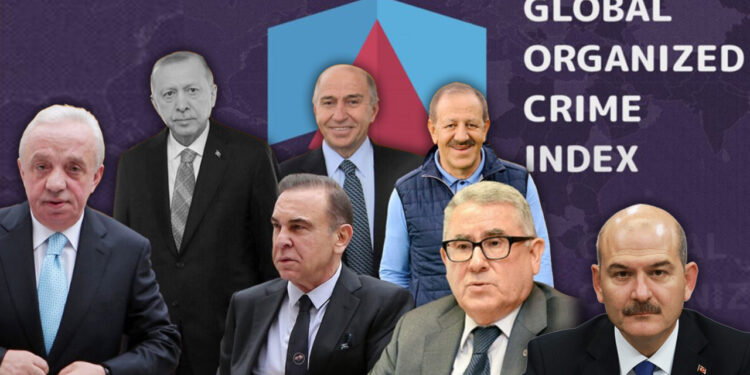The 2023 report of the International Organised Crime Initiative has identified Turkey as the country with the highest organised crime index in Europe. Turkey now holds the top position in Europe for organised crime, while ranking 14th in the world.

Turkey has surged to the top of Europe’s organised crime index, ranking 14th globally, in the Geneva-based International Organised Crime Initiative’s latest report.
The 2023 report shows that Turkey’s Organised Crime Index score has worsened, rising from 6.89 in 2021 to 7.03 this year. This score, on a scale of 1 to 10, indicates the prevalence of organised crime in a country.
The index compares organised crime activity in 193 UN member states. Data for the research is collected by reviewing publications on organised crime and verified for accuracy by local experts and groups. The comprehensive assessment of the Organised Crime Index includes 20 sub-items, assessing both the criminal environment and criminal actors.
Within the criminal environment category, Turkey faces significant concerns in the areas of human trafficking, arms smuggling, heroin, cocaine, and synthetic drug trafficking, financial crime, and illicit trafficking in non-renewable resources.
With regard to criminal actors, the report highlights the activities of mafia groups, criminal networks, state actors, foreign criminal actors and private sector actors and their close links to the government in Turkey. It highlights the alarming presence of mafia groups that maintain close ties with government officials and politicians to protect themselves from law enforcement and the judiciary.
Turkey’s overall organised crime score of 7.03 is particularly worrying in areas such as human trafficking, state-linked criminal actors, arms trafficking, heroin trafficking and mafia operations, all of which score 8.5 or higher. The report also highlights Turkey’s role as a transit country for illegal immigrants, facilitating various criminal activities in the region.
The report cites Turkey’s strategic geographical location as a key factor in its involvement in fuel smuggling, heroin and cocaine trafficking.
In terms of leadership and governance, government transparency and accountability in Turkey is described as low, with increasing allegations of corruption, nepotism and bribery in major public tenders, especially in the wake of a financial crisis.
Non-state actors in Turkey, often perceived as political opponents, are reportedly targeted, and numerous civil society organisations have been closed on national security and terrorism grounds. In addition, media pluralism is limited, with a significant proportion of national media under government control and investigative journalists facing legal proceedings and arrest.
The report notes that while Turkey has extradition treaties with several countries, there are serious concerns about the Turkish government’s use of extradition procedures and requests. It also highlighted that in recent years, Turkey has made an increasing number of requests to INTERPOL for politically motivated red notices, targeting journalists, activists and political opponents living abroad.








Leave A Comment